Unlocking Trust & Privacy: A Primer on Zero-Knowledge Proofs
What are zero-knowledge proofs, how do they work, and why do they matter?
By Thomas Winkler
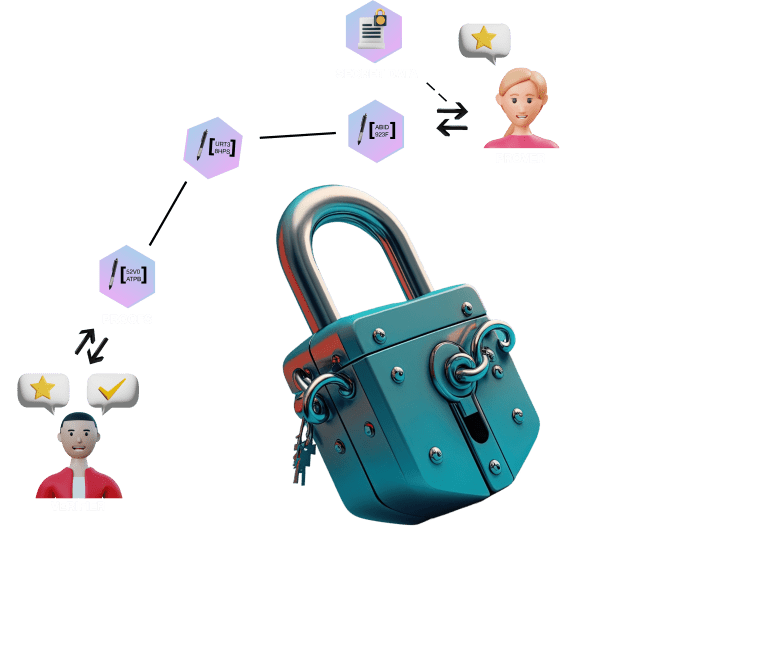
Introduction
A New Kind of Magic
If you have heard of zero-knowledge proofs, you probably – like me – thought that they sounded like a new kind of magic. Can you really prove something to someone else without revealing any new information to them? Doesn’t the whole notion of proving something ride on showing evidence, creating trust by sharing? Clearly, convincing someone to the point that they take it as proof without giving them any new information seems counter-intuitive. And if it works, sure it is some amazing innovation!
This blog post will explore what zero-knowledge proofs are, how they work, and why they matter. We will also look at some of the real-world applications of zero-knowledge proofs.
Why does this matter?
The rising importance of privacy and trust
In today’s world, where everything happens online, trust is more important yet more elusive than ever. If we interact with an unknown third party, how can we be sure that we can trust them? How can we limit the amount of personal data we share and protect ourselves against hacking and security breaches?
Zero-Knowledge Proofs (ZKP) can help in both areas: creating trust – because they generate digital proof – and enhancing privacy – because they do not require additional data to be shared.
Definition
What are Zero-Knowledge Proofs?
A zero-knowledge proof (ZKP) is a way for one party (the prover) to convince another party (the verifier) that a given statement is true, without revealing any additional information to them (that is, beyond the statement’s truthfulness).
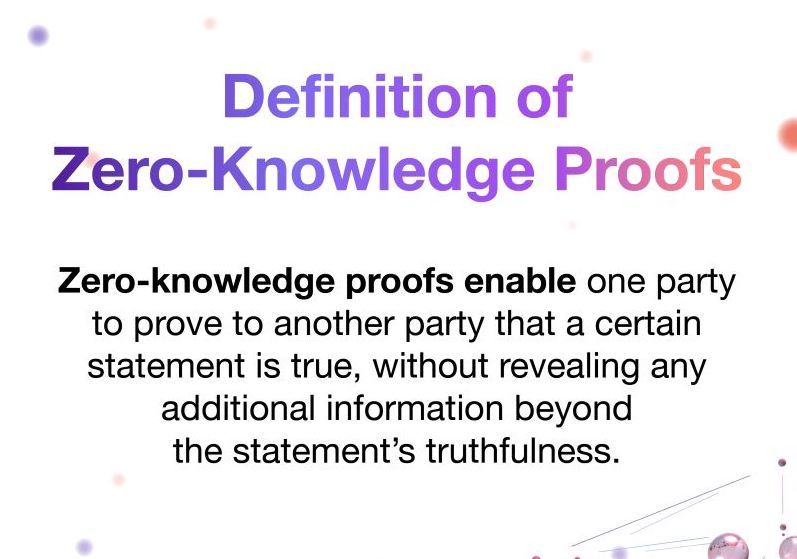
Picture this example scenario: You’re at a club, eager to dance the night away. The bouncer asks for ID to verify your age. Instead of revealing your exact date of birth and other personal details, you simply prove you’re above 21. That’s ZKP in action.
A peek into a zero-knowledge interaction
How do they work?
While there are even “non-technical versions” of ZKP (see the last link under Further Reading for an example), most practical zero-knowledge proofs work are based on cryptography, with some underlying mechanics that are a marvel of cryptographic design. Central to ZKP is an algorithm, often termed a “circuit”, transparently known to all involved entities. This transparency fosters mutual trust. Different algorithmic approaches might necessitate varied interactions between the prover and verifier. Some involve multiple challenge-response exchanges, while others are streamlined into a singular interaction.
The prover uses confidential data as input to the algorithm (the circuit). The output of the circuit is the zero-knowledge proof, which she sends to the verifier. Due to the intricate cryptographic nature of this algorithm, one cannot reverse the operation to extract the original secret from the proof data. Yet, when the verifier examines the proof data and algorithm, they form assurance of the proof’s legitimacy.
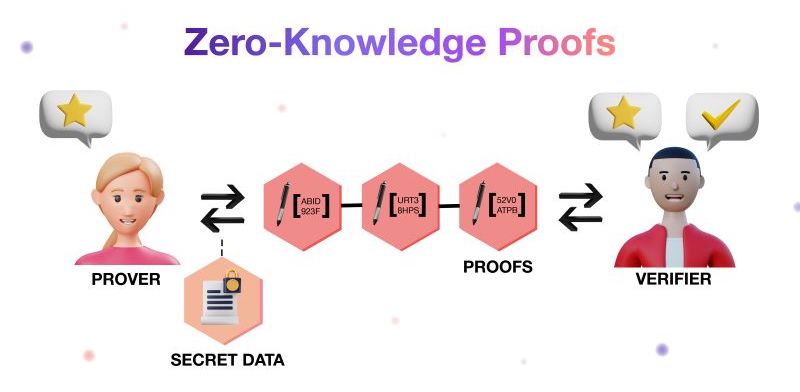
Fundamental attributes
Key Properties of ZKP
The properties of zero-knowledge proofs that make them so special and trustworthy are:
- Completeness: If the prover knows the secret, they can always generate a valid proof.
- Soundness: If the prover does not know the secret, they cannot generate a valid proof.
- Zero-knowledge: The verifier cannot learn anything about the secret from the proof.
- Efficiency: Zero-knowledge proofs can be generated and verified efficiently.
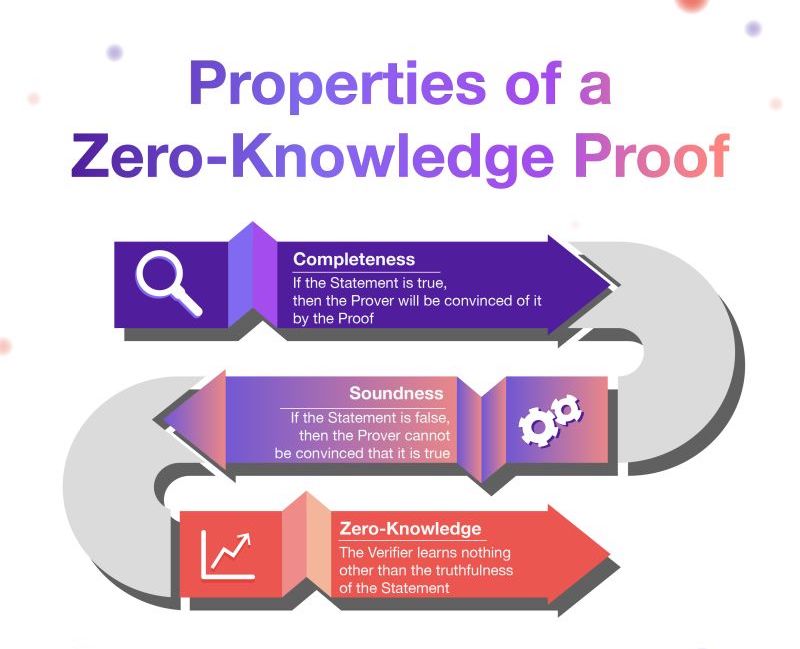
Where the magic happens
Achieving the Impossible: Balancing Proof and Privacy
Zero-knowledge proofs can achieve the seemingly impossible task of balancing proof and privacy by using a clever cryptographic trick.
The trick is to create a proof that is based on the secret, but does not actually reveal the secret itself. This is done by using a mathematical function that maps the secret to a proof, but in such a way that the proof cannot be reversed to find the secret.
This trick allows the prover to prove that they know the secret without revealing it. The verifier can verify the proof, but they cannot learn anything about the secret from the proof.
Let’s go back to our example, where you are at the entrance of a bar, and the bouncer demands that you are over 21 years old. The traditional way would be to show your ID, such as a driving license. But that reveals your birthdate, name, and many other things about yourself. A zero-knowledge proof, on the other hand, would give the bouncer a proof that you are over 21, without giving away any other information. This can be achieved by a clever ZKP algorithm (circuit) that takes in the information from your ID, e.g., your full name and birthdate, plus an electronic signature by an issuing authority that is trusted by all parties, and derives a ZK proof that could only have been created based on a valid ID document and an age of over 21.
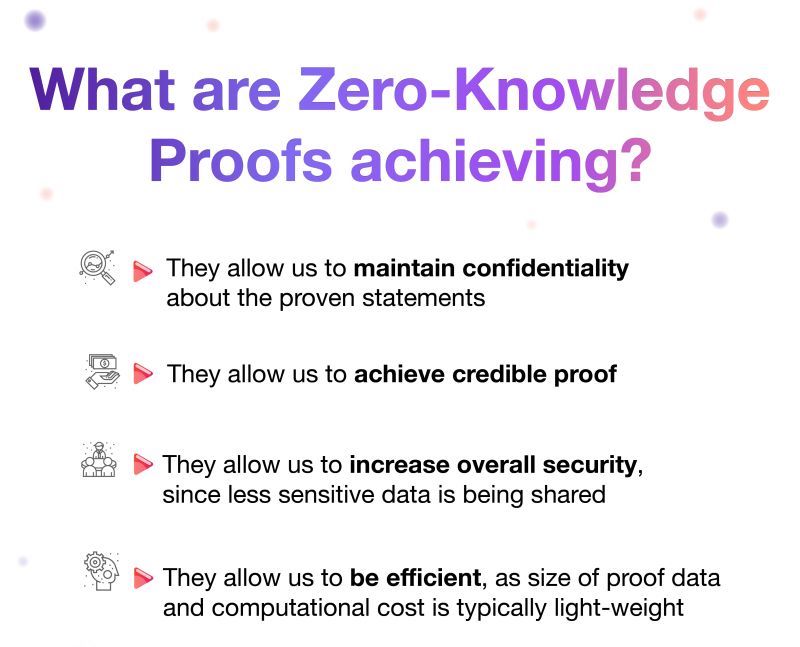
Examples for ZKP Uses
Real-World Applications
Below are just a few examples of how ZKP can be applied:
- Secure voting: Zero-knowledge proofs can be used to verify that a voter is eligible to vote without revealing who they voted for. This can help to protect voter privacy and prevent voter fraud.
- Identity verification: Zero-knowledge proofs can be used to verify a person’s identity without revealing their personal information. This can help to protect user privacy and make it easier to do things like sign contracts and open bank accounts online.
- Decentralized finance (DeFi): Zero-knowledge proofs can be used to verify the authenticity of financial transactions without revealing the transaction details. This can help to protect user privacy and prevent fraud.
- Supply chain management: Zero-knowledge proofs can be used to verify the products’ authenticity and origins. This helps ensure that products are not counterfeit or contaminated, but without revealing all sources and suppliers.
- Artificial Intelligence: Zero-knowledge proofs can be used to train machine learning (AI) models without revealing the training data. This protects the privacy of the data and prevents data leaks.
How various algorithms and concepts give varied benefits
Different flavors
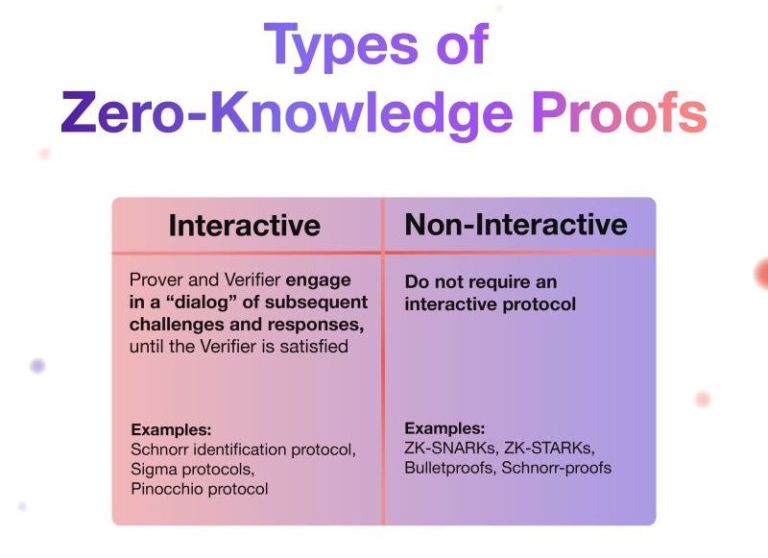
Reality check on where we are today
Limitations and Challenges
While there are some applications already where ZKP work perfectly and add immense value, their widespread adoption does not come without challenges and current limitations:
- Complexity: Zero-knowledge proofs can be computationally expensive to generate and verify. This can be a challenge when real-time verification is needed.
- Security: Zero-knowledge proofs are based on complex mathematical algorithms. If these algorithms are not implemented correctly, they can be vulnerable to attack.
- Usability: Zero-knowledge proofs can be difficult to use, especially for non-technical users. This can be a challenge for widespread adoption of zero-knowledge proofs.
- Standardization: There is no single standard for zero-knowledge proofs. This can make it difficult for different systems to interoperate.
Despite these current limitations and challenges, zero-knowledge proofs have the potential to revolutionize the way we interact with the world around us. As the technology continues to develop, we can expect to see zero-knowledge proofs being used in more and more applications, from securing our financial transactions to protecting our privacy.
Conclusion and Further Reading
While revolutionary, Zero-Knowledge Proofs are just one piece of the evolving jigsaw of digital trust and privacy. As we tread into a future marked by decentralized platforms and heightened data sensitivity, tools like ZKP become invaluable.
Feel free to explore more on our Blog and newsletter, or check out the links below for further reading:
- Zero-Knowledge Proofs: An illustrated primer
This is a series of blog posts by Matthew Green, a cryptographer and professor at Johns Hopkins University. – https://blog.cryptographyengineering.com/2014/11/27/zero-knowledge-proofs-illustrated-primer/ - zkSNARKs: Under the Hood – This blog post is from Vitalik Buterin, co-founder of Ethereum. It delves deeper into zkSNARKs, a particular kind of zero-knowledge proof popular in blockchain contexts. https://medium.com/@VitalikButerin/zk-snarks-under-the-hood-b33151a013f6
- Zero Knowledge Proof (with Avi Wigderson) – https://www.youtube.com/watch?v=5ovdoxnfFVc
- Zero Knowledge Proofs with a non-technical “Find Waldo” example https://www.youtube.com/watch?v=5qzNe1hk0oY
Start your Web3 journey today with zbyte.

